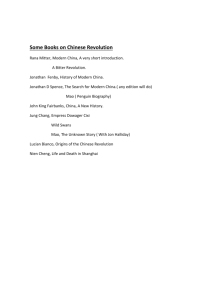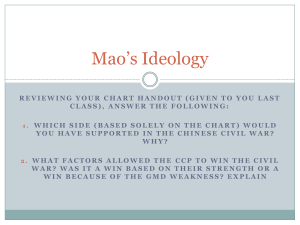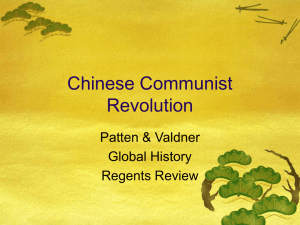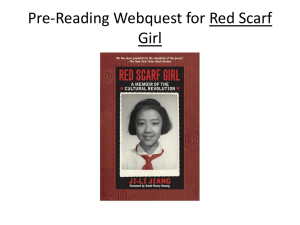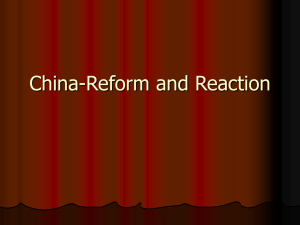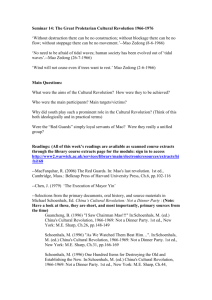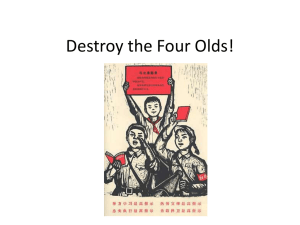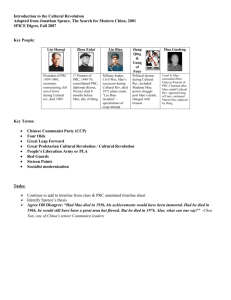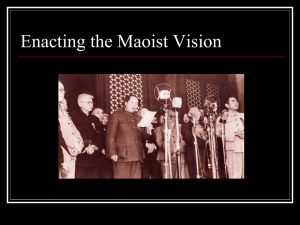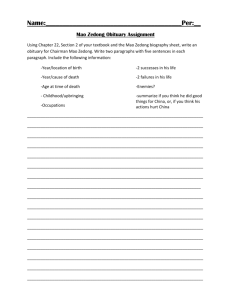History 3345: The People's Republic of China 中华人民共和国史
advertisement
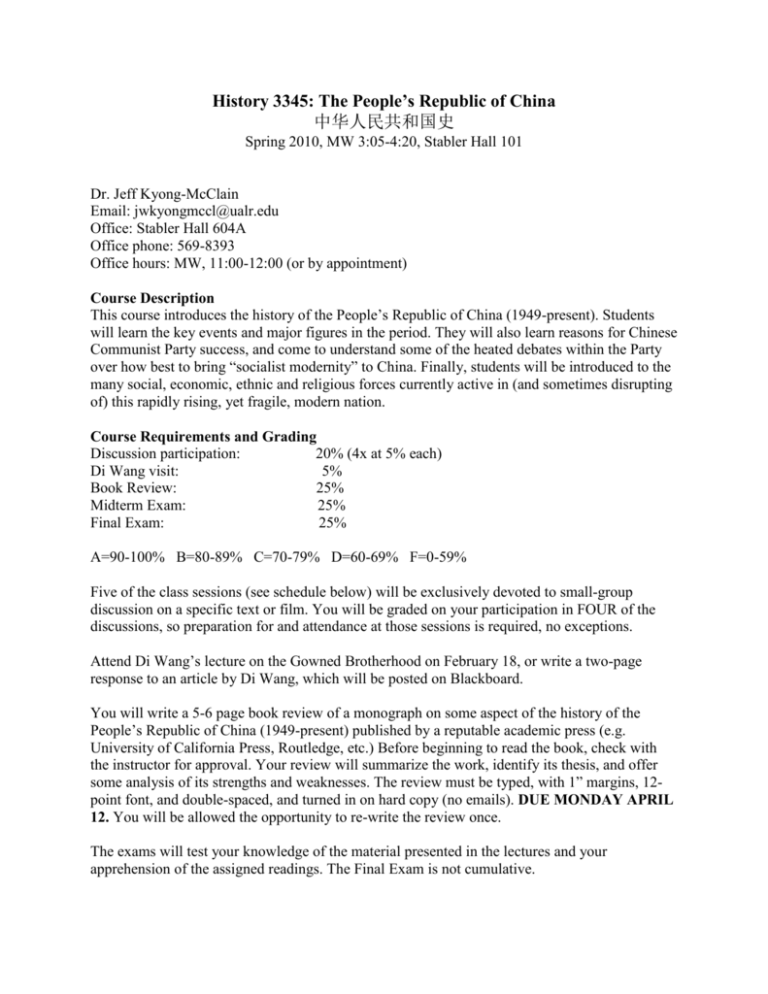
History 3345: The People’s Republic of China 中华人民共和国史 Spring 2010, MW 3:05-4:20, Stabler Hall 101 Dr. Jeff Kyong-McClain Email: jwkyongmccl@ualr.edu Office: Stabler Hall 604A Office phone: 569-8393 Office hours: MW, 11:00-12:00 (or by appointment) Course Description This course introduces the history of the People’s Republic of China (1949-present). Students will learn the key events and major figures in the period. They will also learn reasons for Chinese Communist Party success, and come to understand some of the heated debates within the Party over how best to bring “socialist modernity” to China. Finally, students will be introduced to the many social, economic, ethnic and religious forces currently active in (and sometimes disrupting of) this rapidly rising, yet fragile, modern nation. Course Requirements and Grading Discussion participation: 20% (4x at 5% each) Di Wang visit: 5% Book Review: 25% Midterm Exam: 25% Final Exam: 25% A=90-100% B=80-89% C=70-79% D=60-69% F=0-59% Five of the class sessions (see schedule below) will be exclusively devoted to small-group discussion on a specific text or film. You will be graded on your participation in FOUR of the discussions, so preparation for and attendance at those sessions is required, no exceptions. Attend Di Wang’s lecture on the Gowned Brotherhood on February 18, or write a two-page response to an article by Di Wang, which will be posted on Blackboard. You will write a 5-6 page book review of a monograph on some aspect of the history of the People’s Republic of China (1949-present) published by a reputable academic press (e.g. University of California Press, Routledge, etc.) Before beginning to read the book, check with the instructor for approval. Your review will summarize the work, identify its thesis, and offer some analysis of its strengths and weaknesses. The review must be typed, with 1” margins, 12point font, and double-spaced, and turned in on hard copy (no emails). DUE MONDAY APRIL 12. You will be allowed the opportunity to re-write the review once. The exams will test your knowledge of the material presented in the lectures and your apprehension of the assigned readings. The Final Exam is not cumulative. Assigned Texts Required: Mao Zedong, Quotations from Chairman Mao (China Books and Periodicals, 1990) Jonathan Spence, Mao Zedong: A Life (Penguin, 2006) Anita Chan, Richard Madsen, Jonathan Unger, Chen Village: Revolution to Globalization, 3rd edition (University of California Press, 2009) Perry Link, Richard Madsen, Paul Pickowicz, eds., Popular China: Unofficial Culture in a Globalizing Society (Rowman and Littlefield, 2002) Additional readings on Blackboard (indicated below by ‘*’) Additional readings distributed in class Suggested: Jonathan Spence, The Search for Modern China, 2nd edition (W.W. Norton, 1999) Maurice Meisner, Mao’s China and After, 3rd edition (Free Press, 1999) Schedule Week 1 – Backgrounds (Map of China*; Pinyin pronunciation guide*; Selections from Confucius’ Analects*) M. (1/11): Course introduction W. (1/13): Confucianism and the imperial state Week 2 – Dynastic Decline and Republican Revolution (Chapter 1 of Lucien Bianco, Origins of the Chinese Revolution*) M. (1/18) – NO CLASS, MLK HOLIDAY W. (1/20) – Chinese nationalism and the abortive Republican Revolution Week 3 – The Birth and Growth of the Chinese Communist Party (CCP) (Spence, Mao, pp. 1-119; Lu Xun, “A Madman’s Diary”*) M. (1/25) – The Birth of the CCP W. (1/27) – Sino-Japanese War and the triumph of the CCP Week 4 – Oct. 1, 1949: The People’s Republic of China (PRC) (readings yet to be determined) M. (2/1) – Early efforts at Land Reform and Thought Reform W. (2/3) – “Aid-Korea, Resist-America” and its implications Week 5 – Economic and Ideological Debates (Spence, Mao, 120-178) M. (2/8) – The first Five-Year Plan, 1953-1957 W. (2/10) – The Great Leap Forward Week 6 – Maoism (Quotations from Chairman Mao, all) M. (2/15) – Class Discussion of Quotations from Chairman Mao (attendance required) W. (2/17) – NO CLASS, SEE BELOW Th. (2/18) – Dr. Di Wang lecture @ 3:30 (location yet to be determined) Week 7 – The Great Proletarian Cultural Revolution (Cultural Revolution posters*) M. (2/22) – The Politics of the Cultural Revolution W. (2/24) – The Culture of the Cultural Revolution Week 8 – Chen Village under Mao (Chan, Madsen and Unger, pp. 1-185) M. (3/1) – Class Discussion of pp. 1-185 of Chen Village (attendance required) W. (3/3) – Midterm Review Week 9 – Exam and the Death of Mao (Chapter 8 of Schaller, The United States and China*) M. (3/8) – Midterm Exam W. (3/10) – Mao’s last years Week 10 – Reform and Opening-Up (Chan, Madsen and Unger, pp. 267-396) M. (3/15) – Deng Xiaoping and the Four Modernizations W. (3/17) – Class Discussion of pp. 267-396 of Chen Village (attendance required) Week 11 – SPRING BREAK M. (3/22) – NO CLASS W. (3/24) – NO CLASS Week 12 – A Fifth Modernization? (readings yet to be determined) M. (3/29) – Democracy Wall to Tiananmen Square W. (3/31) – Searching for a guiding ideology Week 13 – The return of economic classes (Popular China, pp. 111-135, 189-206, 207-250) M. (4/5) – The ultra rich and the middle class W. (4/7) – The rural and urban poor Week 14 – Film M. (4/12) – Film: Blind Shaft (BOOK REVIEW DUE) W. (4/14) – Class Discussion of Blind Shaft (attendance required) Week 15 – Contemporary Foreign (or not so foreign) Policy Concerns (Bovingdon on Xinjiang*; Newspaper accounts of 2008 Tibet riots*) M. (4/19) – The persistent problem of Taiwan, Tibet and Xinjiang W. (4/21) – Extending influence internationally Week 16 – Globalization and Culture (Popular China, pp. 9-38, 137-162; “McDonald’s in Beijing”*; Chinese websites*) M. (4/26) – Chinese culture and global culture W. (4/28) – Class Discussion of week’s readings (attendance required) Week 17 – M. (5/3) – Final Review Final Exam, Monday, May 10, 1:30 pm-3:30 pm Behavior Befitting Students of History Students should arrive to class on time and leave only when class is dismissed. All cell phones and other electronic devices must be turned off during class, and full attention given the speaker. Discussion should remain focused on the issue at hand. Disagreements are welcomed during class discussion, but in all cases require that they be presented with respect, taking nothing away from the dignity of the person with whom you disagree. Cheating and Plagiarism Cheating and plagiarism will not be tolerated. Anyone caught having cheated or plagiarized on a test or paper will receive an automatic ‘F’ for that assignment, and possibly further penalties depending on severity of the offense. Plagiarism, as defined by the UALR Dean of Students, is: “To adopt and reproduce as one’s own, to appropriate for one’s own use and incorporate in one’s own work without acknowledgment, the ideas of others or passages from their writings and works.” It is your responsibility to understand what constitutes plagiarism; ignorance of the definition will not be accepted as an excuse. If you are in doubt, ask the professor. Students with Disabilities It is the policy of the University of Arkansas at Little Rock to create inclusive learning environments. If there are aspects of the instruction or design of this course that result in barriers to your inclusion or to accurate assessment of achievement–such as time-limited exams, inaccessible web content, or the use of non-captioned videos–please notify the instructor as soon as possible. Students are also welcome to contact the Disability Resource Center, telephone 501569-3143 (v/tty). For more information, visit the DRC website at http://ualr.edu/disability/. History Department Student Learning Objectives – Upper-Level Courses 1. Demonstrate a significant degree of knowledge about both United States and World history through completion of a broad selection of courses in history. 2. Ask appropriate historical questions that demonstrate an understanding of the discipline of history and distinguish it from those of other disciplines. 3. Distinguish between primary sources and secondary sources used in the writing of history and know how to use and analyze each appropriately. Students will thus be able to: a. Analyze a primary source as a product of a particular historical context; b. Respond critically to a secondary source, taking into account the primary sources used by the historian, the historian’s methodology, the logic of the argument, and other major interpretations in the field. 4. Present historical analysis and arguments in a clear written form, including the ability to construct an argument by marshalling evidence in an appropriate and logical fashion. 5. Write a research paper that asks a significant historical question, answers it with a clear thesis and a logical argument, supports it with both primary and secondary sources documented according to the standards of the Chicago Manual of Style, and is written in clear and artful prose with the grammar and spelling associated with formal composition. Disclaimer The instructor reserves the right to make changes to the syllabus over the course of the semester.
